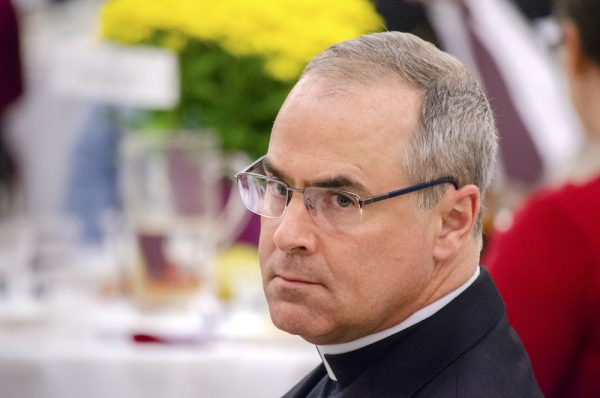Fr. Scalia talks to priests about the priesthood, the pandemic and Padre Pio

Fr. Paul D. Scalia also spoke at the annual Red Mass for those in the law profession on Thursday, Sept. 24, in the Cathedral of the Immaculate Conception in Wichita. That story is available at DigitalCatholicAdvance.org. (Advance photo)
Father Paul D. Scalia talked about the priesthood, the pandemic, and St. Padre Pio to priests of the Diocese of Wichita Wednesday, Sept. 23, during a two-day visit to Wichita where he delivered four talks.
He talked to the priests gathered at St. Mark the Evangelist Parish in Colwich about the priesthood and the pandemic through the lens of Padre Pio’s life.
Fr. Scalia, the son of the late Antonin Scalia and pastor of St. James Parish in Falls Church, Virginia, described the Italian saint as an extraordinary saint and an extraordinary example of the priesthood.
“I think it’s good for us to reflect on his example because, in a sense, we really should imitate him. Which sounds crazy, when you think of all of the amazing things that happened in his life, all the miracles – he bilocated!” Fr. Scalia said. “That would be nice, wouldn’t it? You know, we would have been here earlier.”
Padre Pio could read souls
He addressed Padre Pio’s ability to “read” souls, about his stigmata, and his captivating Masses. “His Masses went on for hours. At one point, his superiors had to tell him (to limit them to half an hour, because he would just linger over the Sacrifice of the Mass and pause and just soak it all in.”
He did all these miraculous things, and the church puts him before us to imitate, Father Scalia said. “How do we imitate these aspects of his priesthood?”
He asked the priests to remember other miraculous events – in Jesus’ life and in church history.
“They’re there so that we can have an appreciation for God’s ordinary work, for the ordinary means of grace, and the ordinary means of salvation,” he said. “Our Lord multiplied the loaves and the fish in the desert. But that wasn’t to be normative. People weren’t expecting that to happen all the time. And he just did it twice. But it was the call to mind, of course, the normal way in which he was going to feed us in the Eucharist.”
Putting Eucharistic miracle in context
Fr. Scalia said Eucharistic miracles occurred within the context of doubt or irreverence, so we shouldn’t necessarily wish for them.
“But what they do is call to our attention what we should value,” he said, adding that Padre Pio’s life should be the standard for priests, not out of the ordinary.
Although priests of the diocese can’t celebrate Masses that go on for hours, Fr. Scalia said, they can have that awareness, appreciation, and be caught up in what is extraordinary in the Mass.
“He appreciated most of all the simplicity of our Lord’s sacrificial presence in the Eucharist,” he said. “That simple host becomes the body of Christ who’s being offered to the Father. He could zero in on that and appreciate the profundity of it.”
Pandemic changes Mass-going
Because of the pandemic, Fr. Scalia said, many priests are saying Mass in front of a camera without a congregation. During the height of the pandemic, he said, one of the other five priests in his rectory would always serve at his brother priest’s Mass to make sure there was another live person in the church.
“Because otherwise, it’s just this weird thing. You’re saying Mass and there’s nobody there – which is weird. It’s not the way it should be. But there is a good takeaway from that.
“When we’re standing at the altar, we’re standing in the role of a mediator. We’re not just facilitating prayer for the congregation, we’re not just leading them in prayer – we were doing those things, yes – but what makes the Catholic priesthood distinct is that we are offering a sacrifice that nobody else in the church can offer.”
The prayers of the congregation ascend through this sacrifice, he said. “And if we’re not there doing that, then their prayers are different. It’s a completely different thing.”
The pandemic instilled in the faithful an appreciation of the Mass, the Eucharist, and Confession, he said, before talking about Padre Pio’s devotion to Confession and how he spent many hours in a very uncomfortable confessional.
Confession a forte of Padre Pio
“Being like Padre Pio is allowing ourselves…to really being present to people in the confessional,” he said.
The pandemic was also difficult for priests because they yearn to be with their flock, he said.
“That suffering that I think a lot of us experienced at a time of wanting to be with the people but being limited and having to settle for doing it virtually – which is just weird, that’s a suffering that I think should have been offered, and still can be.”
He closed by talking about Padre Pio’s ability to bilocate and several of the stories attributed to that ability.
“The pandemic has been so frustrating because priests can’t be present. The reason for the parish priesthood is precisely so that the shepherd is among his people.”
Padre Pio was able to be present in a miraculous way, he added.
“Technology has been a great gift because it’s enabled us to remain in contact,” Fr. Scalia said. “But at the same time, I think it’s highlighted even more the limitation of technology, and that nothing substitutes for a priest being present to his people.”
